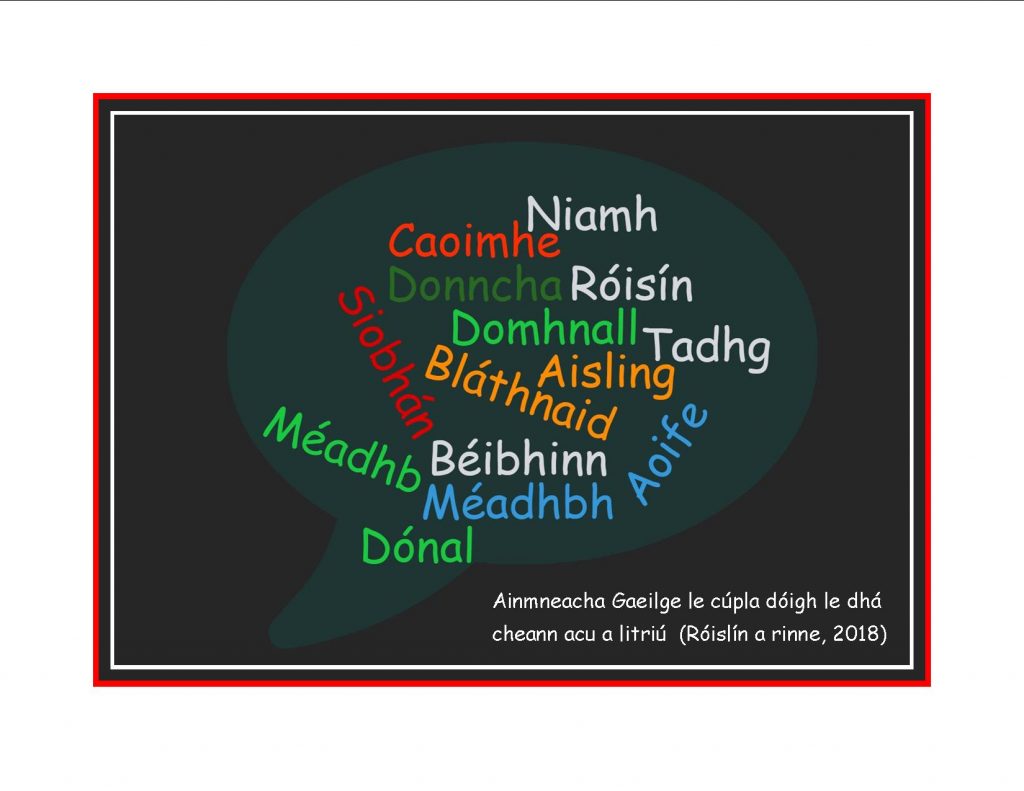An féidir leat déileáil leo seo? Irish Language Practice for the New Video ‘When You Order Coffee with an Irish Name’ Posted by róislín on Aug 16, 2018 in Irish Language
(le Róislín)
Many of you many have seen by now the entertaining new video ‘When You Order Coffee with an Irish Name,’ which shows a barista in a coffee bar looking baffled by some traditional Irish names (nasc thíos). Perhaps some of you have had similar experiences in real life. If so, scríobh isteach, le do thoil agus inis dúinn cad a tharla. Of course, I’d also love to know what experiences some of the international interestingly-named luminaries of the past would have had, if flavored coffees had been such a thing, back in the day. Rabindranath? U (for U Thant)? Ozymandias? Telemachus? Or how about some of those ainmneacha Piúratánacha, remarkable and memorable in and of themselves, like “O Be Joyful” or “Humiliation” or “No-Merit”? (Nasc thíos dóibh siúd, if you want to see more ainmneacha Piúratánacha)
For today’s blogpost, I’d like to first, look at the Irish expressions for saying “handling something” in all three senses (dealing with, discussing, physically manipulating). Why this phrase? The song in the video asks several times “Can you handle this?” or proclaims “We don’t think you can handle this!” Echoes of what 2001 hit song (amhrán i mBéarla, ar ndóigh)? After that, we’ll look at the Irish names that were featured in the film.
So, three ways to say “to handle something”
- 1) to deal with: déileáil le, lit. (déileáil) deal, (le) with; this is the meaning we want for the concept behind the fís (video, say: feesh)
- 2) to discuss; to discuss (it) – plé; é a phlé
- 3) to physically manipulate – láimhseáil (based on the word “lámh,” hand)
So for the theme of this video, we would use “An féidir leat déileáil leis seo?” when talking about one specific name, or any one thing in general. For the title of this blogpost, though, I used “leo seo,” for “these,” so the phrase “An féidir leat déileáil leo seo?” means “Can you deal with these?” That refers to the group of 12 names mentioned in the blog, not just one at a time.
The “yes” answer to this question would be “Is féidir” and the “no” answer would be “Ní féidir.” Not that the barista bocht actually answers in Irish in the video! Well, of course, the question isn’t posed in Irish, so why would he?
And here’s a little pronunciation tip for beginners. The words “leo” and “seo” have the same set of vowels, so you might think they’d rhyme. But no, “leo” has a long “o” sound, like an “ó” (o-fada, as in “bó” or “dó”). But there is no “fada” because the “eo” combination in Irish is almost always understood to have a long 0 sound, as in “beo,” “deo,” or Tóiceo). The word “seo,” however, is an exception, and the vowel sound is essentially like the “uh” sound in English “fun” or “about” – remember it’s English spelling that’s crazy here, with the “u” and the “a” having the same sound. So Irish “seo” is like English “shun” without the final “n.”
What about the “e” in “leo” and “seo,” you might ask. It’s basically silent, but it does affect how the initial “l” and the initial “s” are pronounced, like the “l” in “million” and the “sh” of English words like “shoe” or “show.” In Irish, “s” followed directly by an “e” is virtually always pronounced like English “sh,” as you already know, really, from “Seán” and “seamróg” (which gives us “shamrock”).
Agus anois, na hainmneacha (with a rough pronunciation guide):
Aoife – EE-fuh
Siobhán – shiv-AWN
Domhnall (which can also be spelled “Dónal”) – the shorter spelling really gives us the pronunciation
Niamh – neev or NEE-uv
Méadhb, in this video (or Méadhbh, or, for that matter, in Old Irish “Medb”) – mayv, as in the late Maeve Binchy
Donncha – DON-uh-khuh (note: it’s 3 syllables)
Béibhinn – BAY-vin
Bláthnaid – BLAW-nidj (note the silent “t”)
Caoimhe – KwEE-vuh
In the captions but not featured on the screen:
Aisling – ASH-ling
Roisín or Róisín – ROH-sheen
Tadhg – tyg, very difficult to represent in a rough guide to pronunciation, but the “dh” is essentially silent although it does change the “a” sound to an “aye/eye/I” sound; this “ty” is as in “my,” “cry” or “fly”
Sin iad na hainmneacha agus tá súil agam gur chuidigh sé seo. And now, those of you have watched the video will know why I’m asking, “Cén Ghaeilge atá ar ‘booty-licious’ “? Leis an ngrúpa “Páiste na Cinniúna,” as it were. An bhfuil tú réidh don litriú seo? SGF – Róislín
Naisc:
When You Order Coffee With An Irish Name Just These, Please https://www.youtube.com/watch?v=aVaHvRLlHr0 Published on Aug 10, 2018. DOP Ciaron Craig; AD: Haley Bishop. Video by: Just These, Please Shot by: Ciaron Craig Edited by: Philippa Carson; Special Thanks: Haley Bishop & Really Bright Media
And if you want a chuckle, check out “Brits Pronounce Irish Names” at https://www.youtube.com/watch?v=KEdxsLAQA1A. Several of the names from the coffee video are covered here. Actually, watching it, I don’t know whether to laugh or cry. Of course, English, in my opinion, with spellings like “rhythm,” “indict,” “gauge,” and “ptomaine” hasn’t got a leg to stand on, not to mention odd pairings like “eye/I/aye/fie/my/sigh” or “cough/tough/though/through/bough/lough.”
Ainmneacha Piúratánacha: A Boy Named Humiliation: Some Wacky, Cruel, and Bizarre Puritan Names By Joseph Norwood (http://www.slate.com/blogs/the_vault/2013/09/13/puritan_names_lists_of_bizarre_religious_nomenclature_used_by_puritans.html). [Hmm, what if Humiliation’s last name had been “Hume”? “Humiliation Hume.” Coincheap suimiúil. And then, if there was ever any ambiguity, you might ask, “To Hume are you talking?” Anyway, I think if I had that name, I’d pick “Hume” as a nickname. Or maybe “Millie,” if the name were given to a girl. – Róislín]

Build vocabulary, practice pronunciation, and more with Transparent Language Online. Available anytime, anywhere, on any device.





Leave a comment: